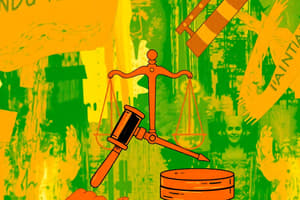Podcast
Questions and Answers
What is the primary source of law in India?
What is the primary source of law in India?
- The Constitution (correct)
- Laws made by local governments
- Customs and usages
- Judicial decisions of various courts
What role does Parliament play in Indian law-making?
What role does Parliament play in Indian law-making?
- It only reviews laws passed by State Assemblies
- It is the ultimate law-making body (correct)
- It only makes laws for local governments
- It issues regulations without legislative approval
Which act is known as the precursor to the Constitution of India?
Which act is known as the precursor to the Constitution of India?
- The Constitution Act, 1950
- The Government of India Act, 1919
- The Indian Independence Act, 1947
- The Government of India Act, 1935 (correct)
What system does the Indian Constitution implement regarding law-making powers?
What system does the Indian Constitution implement regarding law-making powers?
What are the three lists outlined in the Indian Constitution for law-making?
What are the three lists outlined in the Indian Constitution for law-making?
What type of jurisdiction did the Federal Court established in 1937 have?
What type of jurisdiction did the Federal Court established in 1937 have?
What is a Central subject under the Indian Constitution?
What is a Central subject under the Indian Constitution?
What does the Indian Constitution provide for regarding the rights of citizens?
What does the Indian Constitution provide for regarding the rights of citizens?
Explain the significance of the Constitution in the law-making process in India.
Explain the significance of the Constitution in the law-making process in India.
What are the key responsibilities of the Indian Parliament concerning laws?
What are the key responsibilities of the Indian Parliament concerning laws?
How do statutes created by State Assemblies differ from those passed by Parliament?
How do statutes created by State Assemblies differ from those passed by Parliament?
What was the primary function of the Federal Court established in 1937?
What was the primary function of the Federal Court established in 1937?
Discuss the significance of the three lists in the Indian Constitution.
Discuss the significance of the three lists in the Indian Constitution.
What role did the Government of India Act, 1935 play in shaping the Indian Constitution?
What role did the Government of India Act, 1935 play in shaping the Indian Constitution?
How do judicial precedents influence the law in India?
How do judicial precedents influence the law in India?
What is meant by the term 'hybrid legal system' in the context of Indian law?
What is meant by the term 'hybrid legal system' in the context of Indian law?
Flashcards
Constitution of India
Constitution of India
The highest law of India, outlining the framework for the democratic system, fundamental rights, and the powers of the government.
Parliamentary Laws
Parliamentary Laws
Laws made by the Parliament of India, applying to the whole country or parts of it.
State Laws
State Laws
Laws made by the legislative bodies of individual Indian states, applying only within their respective boundaries.
Federal System
Federal System
Signup and view all the flashcards
Judicial Precedents
Judicial Precedents
Signup and view all the flashcards
Customary Law
Customary Law
Signup and view all the flashcards
Central List
Central List
Signup and view all the flashcards
State List
State List
Signup and view all the flashcards
Federal System in India
Federal System in India
Signup and view all the flashcards
Central List (India)
Central List (India)
Signup and view all the flashcards
State List (India)
State List (India)
Signup and view all the flashcards
Study Notes
Sources of Indian Law
- India's legal system is a hybrid, drawing from the Constitution, statutes (laws of Parliament and State Assemblies), judicial precedents (decisions of various courts), and, in some cases, customs and usages.
- India is a parliamentary democracy; laws originate from elected representatives in Parliament and State Assemblies.
- Parliament is the supreme law-making body, with nationwide applicability to laws or regionally specific application, whereas state legislatures create laws valid only within their state borders.
Historical Context
- The Government of India Act, 1935 (passed by the UK Parliament), transitioned India's governance from unitary to federal.
- This act distributed powers between Central and State governments to prevent conflicts.
- The Federal Court, established in 1937 (with appellate, original, and advisory jurisdictions), handled civil and criminal appeals and advised the Governor-General.
- Operating for 12 years, approximately 151 cases were heard in the Federal Court.
- The Federal Court was replaced by India's Supreme Court.
Constitution of India
- The 1950 Constitution of India is the foundational law for the nation's democratic system, outlining the legal framework and citizen rights/duties.
- It defines Central and State government powers and protects Fundamental Rights and describes Fundamental Duties.
- Indian law is rooted in the Constitution, with interconnectedness between laws at different levels and across different sectors of government.
Legislative Lists
- The Indian Constitution divides law-making responsibilities into three lists: Central List, State List, and Concurrent List.
- The placement of a subject on a particular list (Central, State, or Concurrent) determines whether it is subject to Central or State law.
- Examples include: income tax (Central List and administered by the Ministry of Finance), stamp duty (Concurrent List). Both Central and State Governments can create laws related to stamp duty.
Studying That Suits You
Use AI to generate personalized quizzes and flashcards to suit your learning preferences.




